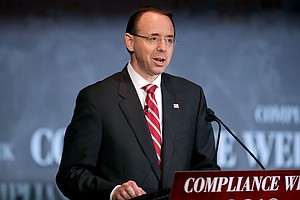6/28/2018

By Jeremy Herb and Laura Jarrett, CNN
(CNN) -- House Republicans sharply took aim Thursday at Deputy Attorney General Rod Rosenstein and special counsel Robert Mueller's investigation in a heated hearing that came at the same time the House passed a resolution rebuking Rosenstein and the Justice Department.
Republicans clashed with Rosenstein over a number of issues, from the text messages of embattled FBI agent Peter Strzok and the start of the Mueller probe to accusations that Rosenstein was withholding information from Congress and threatening congressional aides.
Rosenstein got particularly fiery with Rep. Jim Jordan, the conservative House Freedom Caucus leader who has been one of the most vocal critics of both Rosenstein and Mueller.
"Mr. Rosenstein, we have caught you hiding information from Congress," Jordan charged.
"Your use of this to attack me personally is deeply wrong," Rosenstein responded. "When you find some problem with the production or with questions, it doesn't mean that I'm personally trying to conceal something from you."
The hearing was a public airing of the simmering tensions that have roiled Republicans and Democrats for the past year as they've battled over the investigations into Donald Trump's campaign and Russia and the Republican allegations of FBI misconduct.
Jordan kept barreling into Rosenstein, prompting several protests from Democrats that he was cutting off the deputy attorney general.
"Mr. Rosenstein, did you threaten staffers on the House Intelligence Committee?" Jordan asked, referring to a report earlier this month that staff felt "personally attacked" by Rosenstein.
"Media reports are mistaken," Rosenstein responded.
"Did you threaten to subpoena their calls and emails?" Jordan countered.
"No sir, and there's no way to subpoena phone calls," Rosenstein responded, prompting some laughter from the room.
At the same time that the hearing was being held Thursday, the House passed a resolution 226 to 183 on Thursday demanding that the Justice Department fully comply with subpoenas from the Judiciary and Intelligence committees by July 6.
Conservatives have suggested that the resolution is the last step before taking more drastic measures against Rosenstein, either holding him in contempt or even impeaching him.
Thursday's hearing was actually scheduled to discuss the Justice Department inspector general report into the FBI's handling of the Clinton email investigation, but much of the focus was on the special counsel and the congressional subpoenas.
At the hearing, Rosenstein argued that the House was "mistaken" that the Justice Department wasn't trying to comply with the subpoenas from House Intelligence Chairman Devin Nunes and House Judiciary Chairman Bob Goodlatte, but that did not stop the party line vote.
Democrats have charged that Republicans are making document requests for sensitive materials about ongoing investigations that cannot be shared in order to give Trump a pretext for firing Rosenstein, who supervises the Mueller probe.
"As part of their coordinated and determined effort to undermine the special counsel's investigation, Republicans are requesting documents they know they cannot have," said Rep. Jerry Nadler of New York, the top Democrat on the Judiciary panel.
FBI Director Chris Wray, who was also testifying at Thursday's hearing, offered a bemused explanation for the threats of contempt.
"Certainly when I was minding my own business in private practice in Atlanta, I didn't think I was going to be spending the first 10 months of my job staring down the barrel of a contempt citation for ... conduct that occurred long before I even thought about being FBI director," he said.
The Mueller investigation loomed large over Thursday's hearing, with Republicans pointing to Strzok's anti-Trump text messages to suggest the Mueller probe was tainted. Strzok, who was interviewed behind closed doors on Wednesday, was an investigator for the Clinton and Russia probes, and he was on Mueller's team before he was dismissed when his texts were discovered.
Republican Rep. Trey Gowdy of South Carolina had sharp words about the Mueller investigation, urging him to "finish it the hell up."
"Russia isn't being hurt by this investigation right now. We are. This country is being hurt by it," Gowdy said. "We need to see the evidence. If you have evidence of wrongdoing by any member of the Trump campaign, present it to the damn grand jury. If you have evidence that this president acted inappropriately, present it to the American people."
Rosenstein responded that he wanted Mueller to finish the investigation in an appropriate fashion.
"I've heard suggestions that we should just close the investigation. I think the best thing we could do is finish it appropriately, and reach a conclusion," Rosenstein said. "And I certainly agree with you, sir, that people should not jump to conclusions without seeing the evidence. I've been the victim of fake news attacks myself so I'm sympathetic."
Wray told the committee that 880,000 documents had been produced, and 100 staffers were working on fulfilling the remaining documents around the clock.
Both Rosenstein and Wray made accommodations to attend Thursday's hearing, which did not get the normal seven-days notice under committee rules.
Rosenstein missed a deputy Cabinet member meeting on Thursday morning, according to a source familiar. If he stays for a full day, he will miss another deputies meeting convened by the national security council where the Justice Department is the lead component on a matter of critical national security concern. And he also had to cancel a trip to Georgia on a law enforcement issue.
Wray also came back early from a West Coast trip meeting with special agents in charge, the source said.
This story has been updated and will continue to update with additional developments throughout the day.
